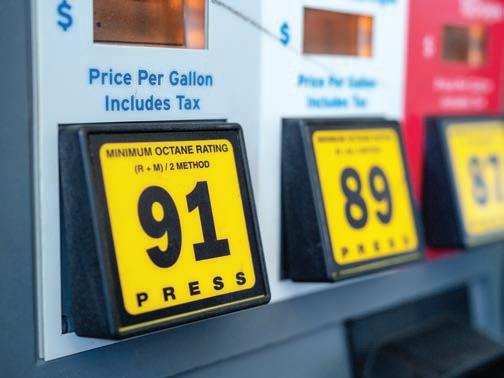
2 minute read
Colorado now collecting 2-cent-per-gallon gas fee
Colorado began collecting a 2-cent-per-gallon fee on gasoline purchases on April 1.
Revenue from the fee, which increases to 3 cents per gallon on July 1, will go toward addressing the state’s multibilliondollar transportation project backlog. e charge was imposed through a bill passed by the legislature in 2021 that also added fees on deliveries, rideshare rides and electric vehicles.
e gas fee was originally supposed to begin in July 2022, but the legislature delayed the start until April 1, at a cost of $45 million, because of high gas prices. A year ago, the average cost of a gallon of regular gas in Colorado was $3.97. In recent weeks, gas prices have hovered around $3.50. e gas fee is set to increase gradually by 1 cent per year until it reaches 8 cents per gallon in July 2028. In July 2032, the fee will be adjusted annually based on in ation.
Other fees imposed by the bill include:
- A 27-cent fee on deliveries
- A 30-cent fee on rideshares e fuel and road-usage fees are the subject of a lawsuit led in Denver District Court by conservatives who argue the generated electricity, or emerging hydrogen technology. Truckers have had success, for example, with so-called renewable natural gas, which is methane captured from the decomposing trash in land lls.
- A 4-cent-per-gallon fee on diesel fuel. Like the gas fee, the diesel fee increases annually — but by 2 cents — until it reaches 16 cents in 2028.

Carriers would also like to see a greater emphasis on a trade-in program that would get older, dirtier diesel rigs o the road. Modern fossil fuel engines burn much more cleanly, and removing the highest- charges were illegally imposed. Colorado’s Taxpayer’s Bill of Rights requires that voters approve all tax increases, but fees can be imposed by the legislature as long as the revenue goes to a set purpose. is story is from e Colorado Sun, a journalist-owned news outlet based in Denver and covering the state. For more, and to support e Colorado Sun, visit coloradosun.com. e Colorado Sun is a partner in the Colorado News Conservancy, owner of Colorado Community Media. emitting engines could go a long way to clean Colorado skies, Fulton said.

Colorado also collects a 22cent tax on each gallon of gas sold. e state’s gas tax is among the lowest in the country.
“ e di culty I’m going to have on that one is nobody wants to replace a diesel with a diesel,” he said. e EPA also adopted new heavy truck standards nationwide in December, but environmental advocates said the California model goes farther in reducing nitrogen oxide that contributes to Colorado’s ozone. ey want the state to keep moving forward on adopting the California model. e Colorado Energy O ce and other state o cials have thoroughly studied the heavy truck market’s capacity in the next few years, and they conclude that clean models will be widely enough available to the industry, said Cindy Copeland, air and climate policy advisor for Boulder County. Copeland is one of a group of Front Range elected o cials and agencies in Colorado Communities for Climate Action, which has been pushing the AQCC to go farther, faster on controlling ozone and greenhouse gases. e AQCC should reject the “market is not ready” claims about clean trucks, Copeland said.
“We heard this argument, the exact same one, when Colorado adopted zero-emissions passenger vehicle standards back in 2019,” said Copeland, noting that state consumers are adopting electric vehicles even faster than planned in that e ort four years ago. “ at’s the way the market is moving.” is story is from e Colorado Sun, a journalist-owned news outlet based in Denver and covering the state. For more, and to support e Colorado Sun, visit coloradosun.com. e Colorado Sun is a partner in the Colorado News Conservancy, owner of Colorado Community Media.










